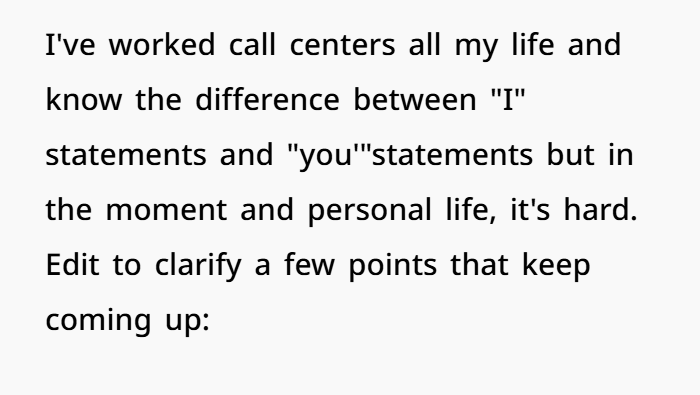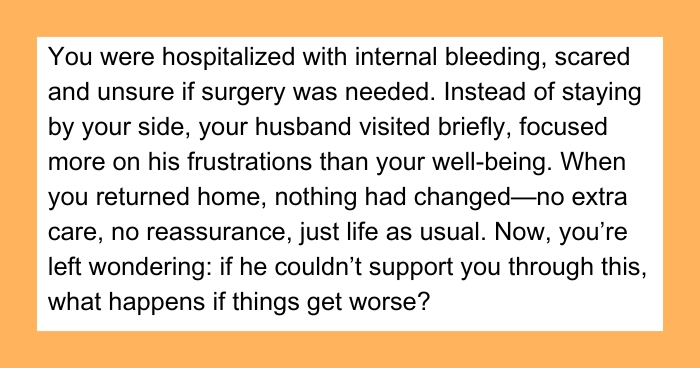‘My husband of 18 years left me alone at the hospital when I was BLEEDING INTERNALLY.’ AITA? UPDATED
(43F) Had really bad stomach cramps and discomfort pain you wish you got checked out turns out I had massive bruises and internal bleeding. I took you to the ER after taking you to several medical offices, and the doctors were afraid you might need surgery. You were in the hospital for four days, scared and facing life-threatening issues. Your husband (49M) only stopped by for a few minutes each day, ignored you for the rest of the time, skipped major visits with doctors, and instead fixated on his frustrations with the hospital, the doctors, and with insurance co-pays rather than providing you with emotional support.
You all but felt abandoned during what was one of the scariest moments of your life thus far, and you think about if this this your new normal, especially that your family has a history of serious illness. Even though you know you did not outright ask your husband to remain, you do feel that him standing by your side seeing naked should be embedded into the marital vows, especially in a time of crisis. Now you wonder if you were overly demanding and you wanted too much from him—or if his indifference is actually a huge, bright, open highway flag that you should avoid this road, and he, altogether, if you are looking for romance.
Read for more info Reddit
























UPDATE












The Emotional & Relationship Dynamics
Your situation raises important questions about emotional support, marital expectations, and long-term care in a relationship. Let’s break it down:
1. The Expectation of Emotional Support in Marriage
Marriage is built on mutual support, particularly in times of crisis. The “in sickness and in health” vow isn’t just a formality; it’s a commitment to be there when one partner is vulnerable. Studies on emotional labor in relationships suggest that partners who show up during health scares foster stronger bonds and long-term marital satisfaction (Gottman, 1999). While your husband may not have been able to physically change your medical situation, his presence and reassurance could have significantly reduced your anxiety.
His lack of support is concerning, not just because he didn’t stay, but because he repeatedly shifted the focus away from your crisis and onto his grievances—whether it was the doctor’s questioning, the chaplain visit, or the hospital’s billing practices. This suggests a self-centered reaction to stress rather than a partner-focused response.
2. Pattern of Neglect or Just Miscommunication?
Your husband’s behavior during your hospitalization wasn’t an isolated incident—it aligns with past patterns. When your son was born, you had to convince him to stay with you, even though postpartum recovery is a critical period for both mother and baby. Similarly, he has a history of dismissing your mental health struggles (“I get sad sometimes too”) rather than offering meaningful support.
This points to a long-standing issue: he lacks empathy and doesn’t seem to understand (or value) emotional labor. While it’s possible that he simply doesn’t realize the depth of your distress, it’s equally likely that he does but prioritizes his own comfort over stepping up as a partner.
3. Should You Have Asked Him to Stay?
Some might argue that because you didn’t explicitly ask him to stay, he wasn’t in the wrong. However, emotional support in a long-term marriage shouldn’t require formal requests—especially in a crisis. Healthy relationships involve partners who anticipate each other’s needs. For example, in studies on caregiver relationships, partners who take initiative in providing support report higher satisfaction than those who only act when directly asked (Neff & Karney, 2017).
That said, your concern about his attitude (eye-rolling, begrudging behavior) if you had asked him to stay suggests that this isn’t just a simple miscommunication—it’s a deeper issue with his willingness to prioritize your needs.
Here’s what top commenters had to say about this one:






Can not be the a-hole for wanting more from him during a scary medical event. Given your family history where a serious illness is concerned, the limited way he’s participating, and the emotional distance really are caution lights. If you are already doubting that you will face any future health crises alone, that is a problem.
Education is communication; but this isn’t really a question of rewording your statement or finding a new and creative way to say it — this is the question of whether your husband even wants to be your supportive husband at all. Therapy (either for you, or possibly for the both of you) may reveal if this is something that can be worked on or a deal breaker. If he is not willing to change, then you may need to consider if this is the type of relationship you want long-term.

